Keyword grouping, also called keyword clustering, is a cornerstone of modern SEO. Gone are the days where one page targeted just one keyword. Now, a single piece of content can rank for hundreds, even thousands, of related terms. Grouping keywords effectively is crucial for smart keyword research.
This technique involves grouping semantically-related keywords based on search intent, often determined by analyzing Search Engine Results Pages (SERPs). This allows you to build content silos, establish topical authority, and efficiently cover a niche without creating redundant pages.
A solid keyword grouping strategy boosts your site's authority and drives more organic traffic. However, manually grouping thousands of keywords is incredibly time-consuming. Thankfully, several tools can automate this process. We've compared 8 popular free and paid keyword grouping tools to help you choose the best fit.
"I built Optiwing as a developer managing my own websites' SEO. I found myself frustrated with complex, expensive subscription-based SEO tools that had lots of unnecessary features for my needs. So I made a simple tool for myself that grew into its own product. Optiwing focuses on a simple, user-friendly approach to essential SEO tasks like keyword grouping, using a pay-as-you-go model." - Tim Schneider, Founder
Optiwing was born out of a need for a straightforward, effective, and affordable SEO solution. Its keyword grouping tool embodies this philosophy, offering the best value and accuracy by focusing on what truly matters: real-time SERP data.
The core logic is simple yet powerful: if 3 or more of the same pages rank in the top results for a set of keywords, those keywords likely share the same search intent and can be grouped. This data-driven approach removes guesswork and helps you create content that precisely matches user intent.
Whether you're using data from popular tools like Ahrefs, SEMrush, Google Keyword Planner, or your own custom file (e.g., from Google Search Console), Optiwing handles it seamlessly.
We tested Optiwing with 1000 keywords from a SEMrush export on "Snowboards". The results were available directly in the browser dashboard shortly after completion, making them easy to scan and analyze. A CSV download is also provided.
The dashboard is clean and intuitive. Since it uses live Google data, you can specify device (mobile/desktop), geolocation, and language for highly relevant grouping.
The tool took about 2 and a half minutes to group the 1000 keywords, which is quite fast considering that it uses real-time Google SERP data. You can see the results here. As you can see it gives tight and accurate clusters of keywords around a topic based on the search results.
Optiwing also includes valuable free tools like a SERP similarity checker (to manually compare keyword intent) and a Top 100 SERP checker to analyze competitors.
In terms of pricing, you get 100 free credits when you sign up to Optiwing, no credit card entry required. Pricing starts at $4.42 per 1000 keywords on a pay as you go (PAYG) basis. Credits never expire and there are no subscriptions to cancel, so no wasted money at the end of the month.
Get 100 free credits on signup. No credit card required. Group your keywords with real-time SERP data and see the difference accurate clustering makes.
For a completely free tool, ZenBrief is a decent choice. It uses Natural Language Processing (NLP) instead of simpler methods like lemmatization (grouping based on word roots).
While NLP is more sophisticated than basic text matching, it still lacks the real-world accuracy provided by analyzing actual Google SERPs, which reflects true search intent. Tools like Optiwing that use SERP data generally provide more reliable groupings for content strategy.
The interface is straightforward, allowing uploads up to 30k keywords (under 1MB). It processes the keywords using its NLP algorithm.
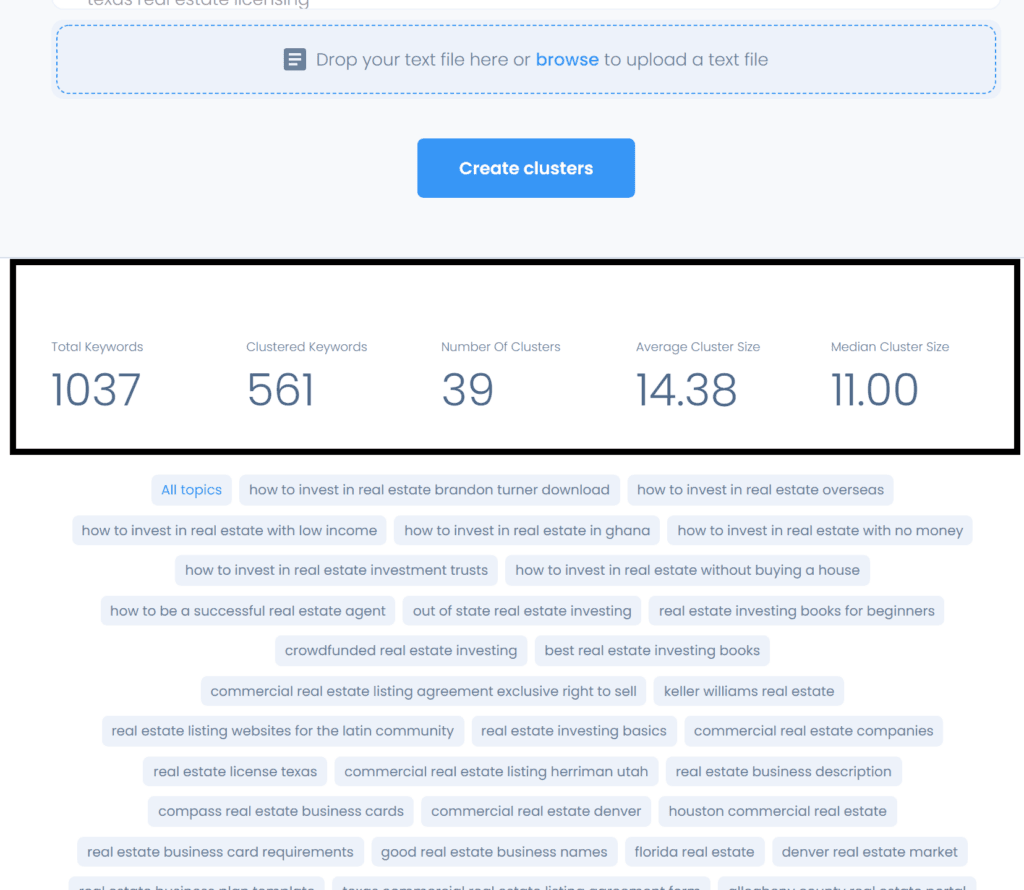
Results can be downloaded per cluster or as a whole. It's a good starting point if budget is zero, but for serious SEO, SERP-based grouping is recommended.
SE Ranking is a full-featured SEO platform like Ahrefs or Semrush, which includes a keyword grouping tool.
Like Optiwing, SE Ranking uses SERP data to group keywords. You can even choose the grouping accuracy by changing the minimum number of shared URLs to group keywords. Accuracy is defaulted to 3 URLs, but you can increase or decrease this.
You can also choose whether you want the tool to run a soft or hard analysis. Soft allows you to groups keywords that have similar URLs to the primary keyword, but not to each other. This can result in broader keyword groups that are not as accurate.
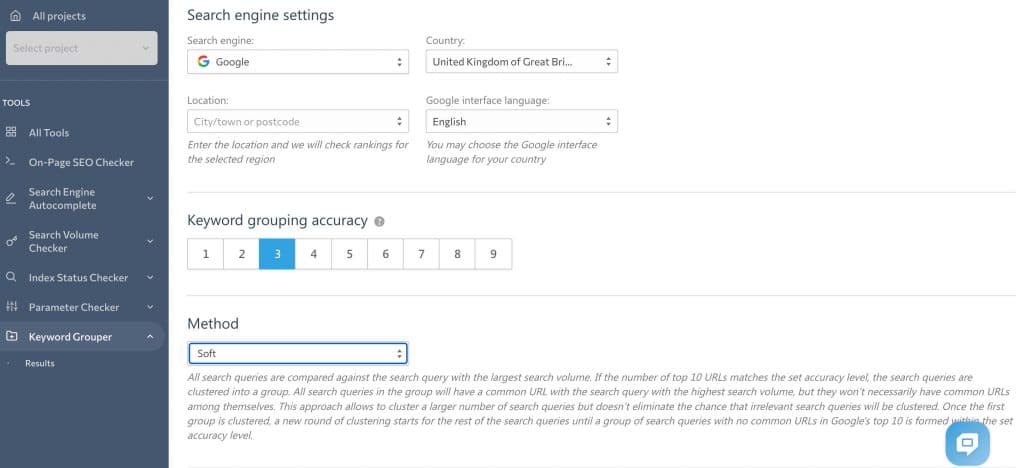
Quite a robust keyword grouping tool, so whats the downside?
Unfortunately, cost and pricing flexibility. To use the SE Ranking keyword grouper you need a full SE Ranking subscription, which starts at $49 per month. And then to use the keyword grouper, you have to additionally pay for every keyword you group ($4 for 1000 keywords, and $5 for 1000 keywords with search volume).
If you mainly plan to use the keyword grouper functionality then this is pretty expensive, and a monthly subscription on top of that can add up quick. But if you plan to use the software for all of it's functionality, it's not a bad deal at all.
Ahrefs, another major player in the all-in-one SEO software space, offers keyword grouping capabilities within its “Keyword Explorer” tool. It features a “Parent Topic” concept and term clustering, essentially grouping similar keywords and showing the total search volume for the cluster.
The clustering is based on SERP similarity, allowing users to group keywords that rank for similar pages. This is integrated directly into their keyword research workflow, offering convenience for existing Ahrefs users. For example, you can instantly cluster keywords by parent topic or filter by SERP similarity within the Keyword Explorer interface.
However, accessing this functionality requires a substantial investment, with plans starting at around $99 per month. Like SE Ranking, Ahrefs bundles many features, targeting professionals and agencies who need a comprehensive toolkit. For users whose main requirement is occasional or large-scale keyword grouping, the high subscription cost makes it an expensive and potentially excessive option compared to specialized or pay-as-you-go tools.
Similar to Ahrefs, SEMrush incorporated a “Keyword Clustering” feature into its Keyword Magic Tool relatively recently (reportedly in late 2024). This tool aims to save users time by automatically grouping keywords based on shared intent, facilitating the development of topical authority.
SEMrush integrates clustering directly into its keyword research process within the Keyword Magic Tool. Users performing keyword research can apply the clustering feature to organize their findings efficiently within the SEMrush ecosystem.
Like Ahrefs and SE Ranking, the primary drawback is cost and accessibility. The keyword clustering tool is only available to SEMrush subscribers, with plans starting around $120 per month for meaningful usage limits. Both SEMrush and Ahrefs cater to professional and enterprise clients by bundling a wide array of features. For individuals or businesses needing only occasional keyword grouping, these all-in-one solutions represent a significant financial commitment and may provide more features than necessary.
Keyword Cupid is one of the older players in the keyword grouping space, known for its focus on SERP data analysis.
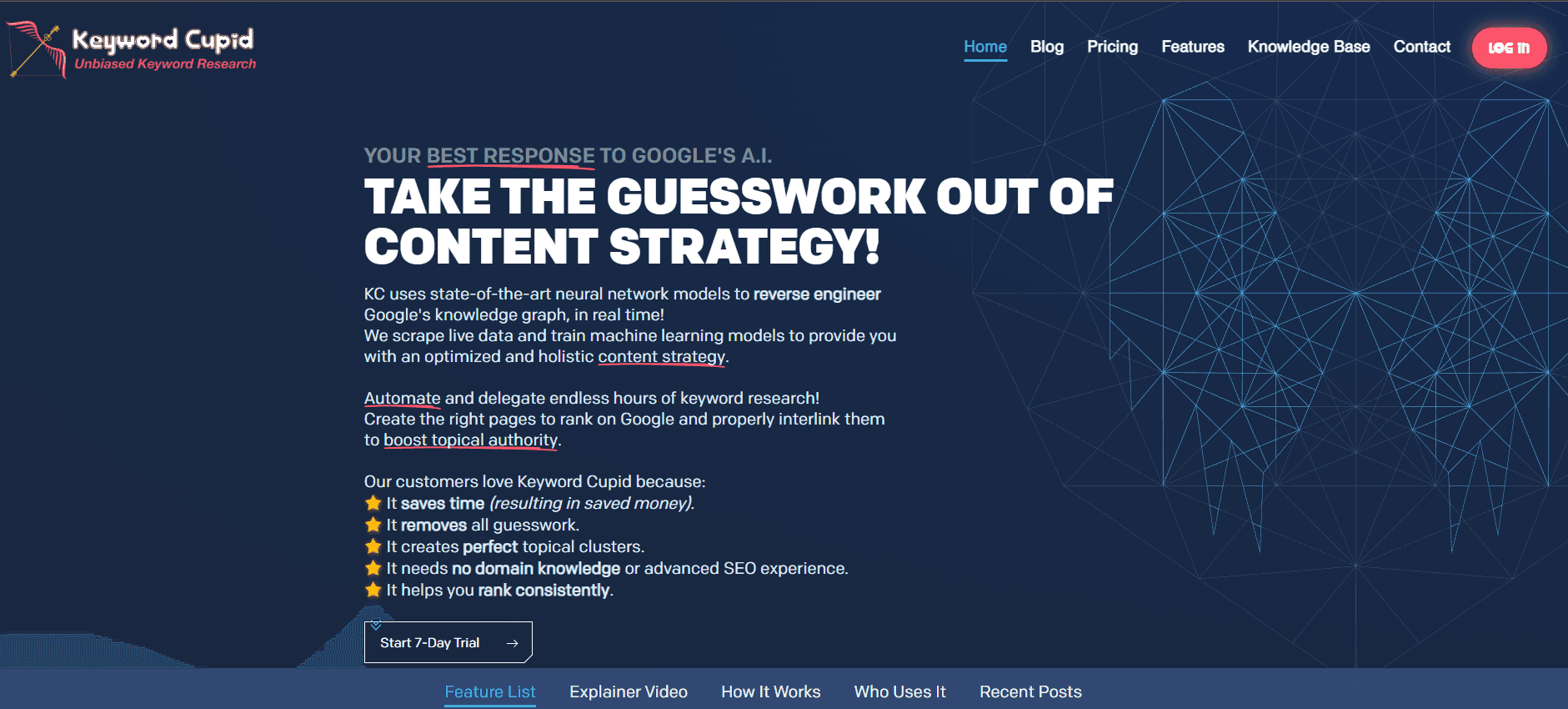
Their keyword grouping tool also uses real-time SERP data to group keywords. Also claiming to use machine learning to identify SERP patterns for groups, and includes a confidence rating for how closely keywords are related.
It's not entirely clear Keyword Cupid's methodology for SERP analysis for overlapping URLs and hard and soft relationships between URLS and keywords. But even being a black box, it clearly offers quite accurate results.
Keyword Cupid offers the functionality of grouping keywords into topic silos, making it easier to define a site's hierarchy, and interactive mind-map visualizations. Here's what a output from Keyword Cupid looks like:
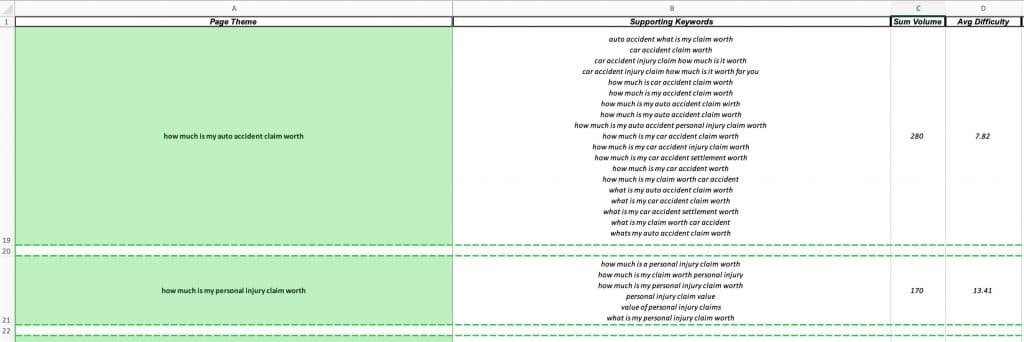
Example of a topic silo visualization:
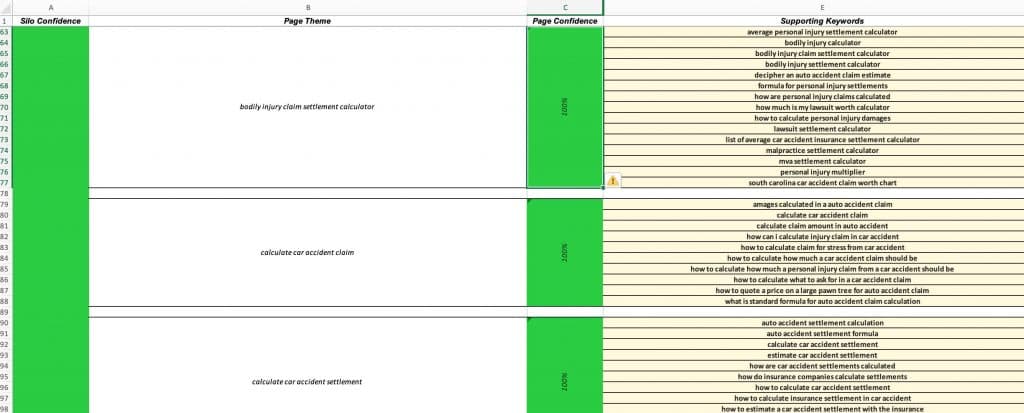
However, Keyword Cupid comes with a hefty price tag and a mandatory subscription. The entry-level $9.99/month plan includes a mere 500 keywords, with additional keywords costing a steep $20 per 1000. Higher tiers offer better per-keyword rates but require significant monthly commitments ($49.99/mo for 5k keywords, $149.99/mo for 20k, etc.). This makes it one of the most expensive options, especially compared to flexible PAYG models like Optiwing.
KeyClusters is another tool dedicated specifically to SERP-based keyword grouping.
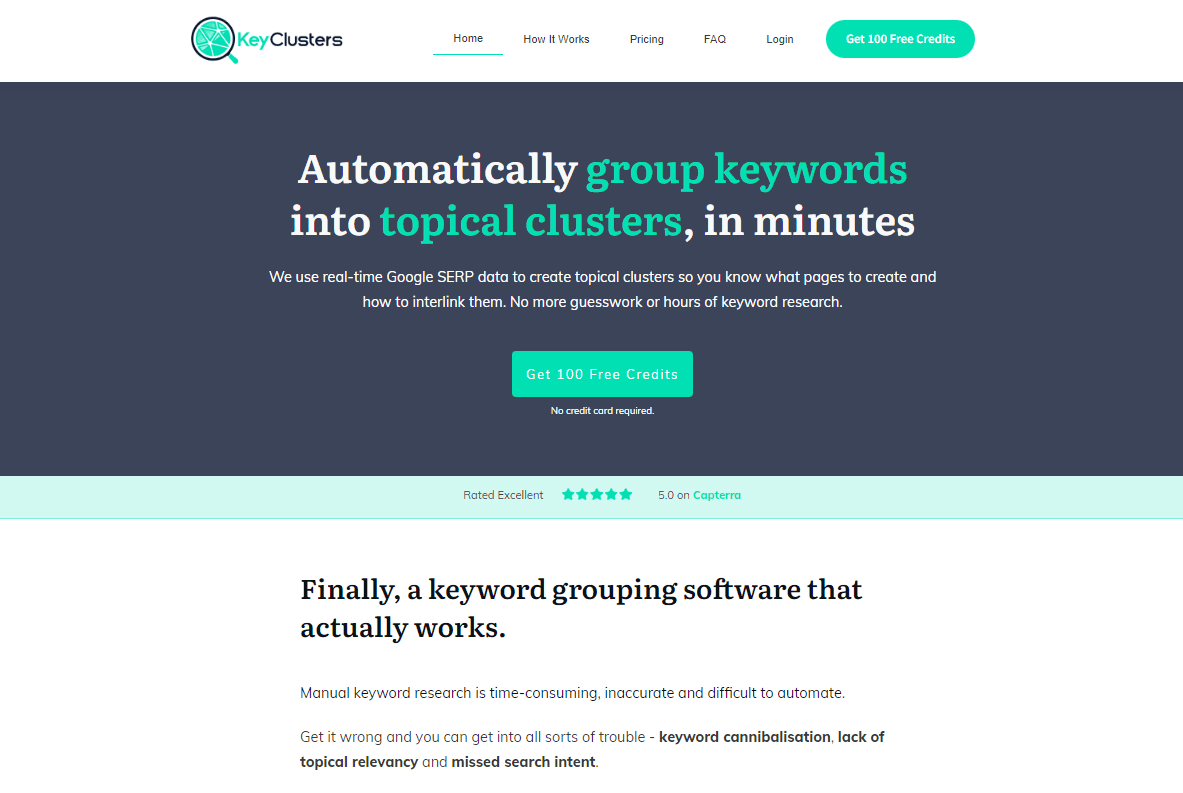
It supports common import formats and uses a similar SERP comparison methodology to Optiwing and SE Ranking.
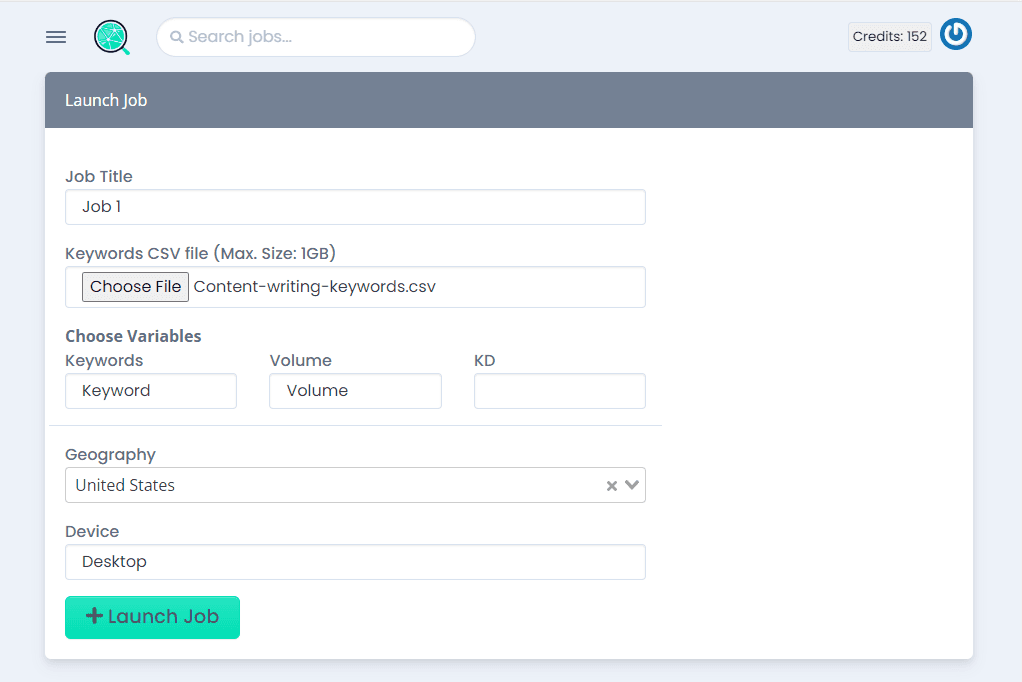
A key difference is that results are only provided as a downloadable CSV file, lacking the convenience of in-browser analysis offered by tools like Optiwing. The UI can also feel a bit less polished.
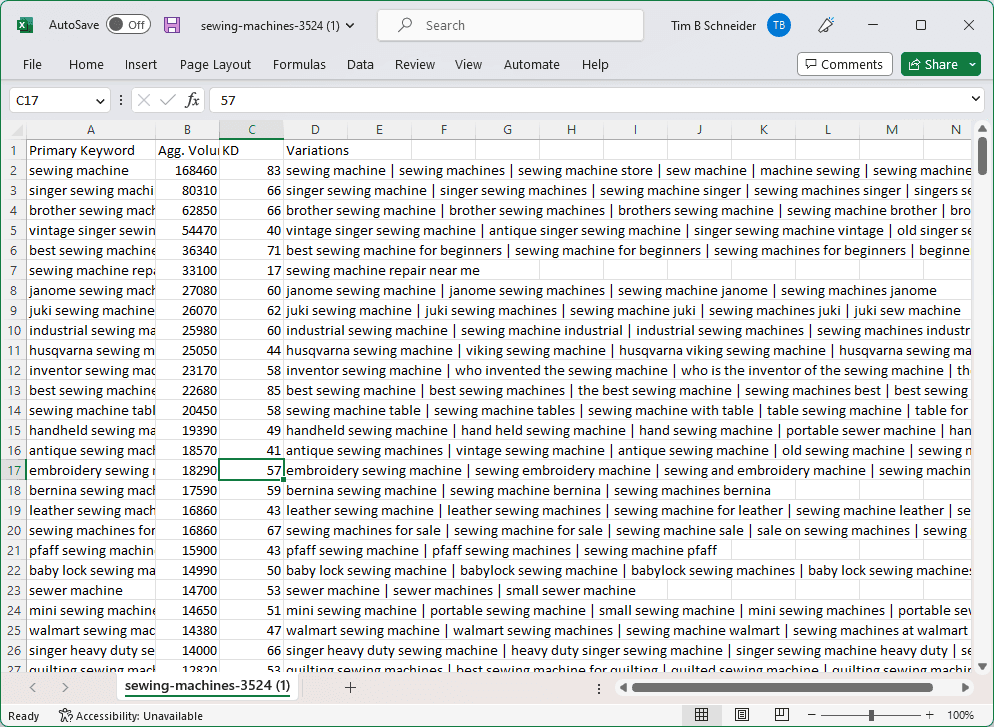
Pricing includes 100 free credits. Pay-as-you-go rates range from $9 down to $4.97 per 1000 keywords, making it competitive, though Optiwing offers slightly better rates at the entry-level PAYG tiers. It's a solid, focused tool, but lacks the integrated features and smoother UX of Optiwing.
Keyword Clarity offers a different, visual approach to keyword grouping and is free to use.
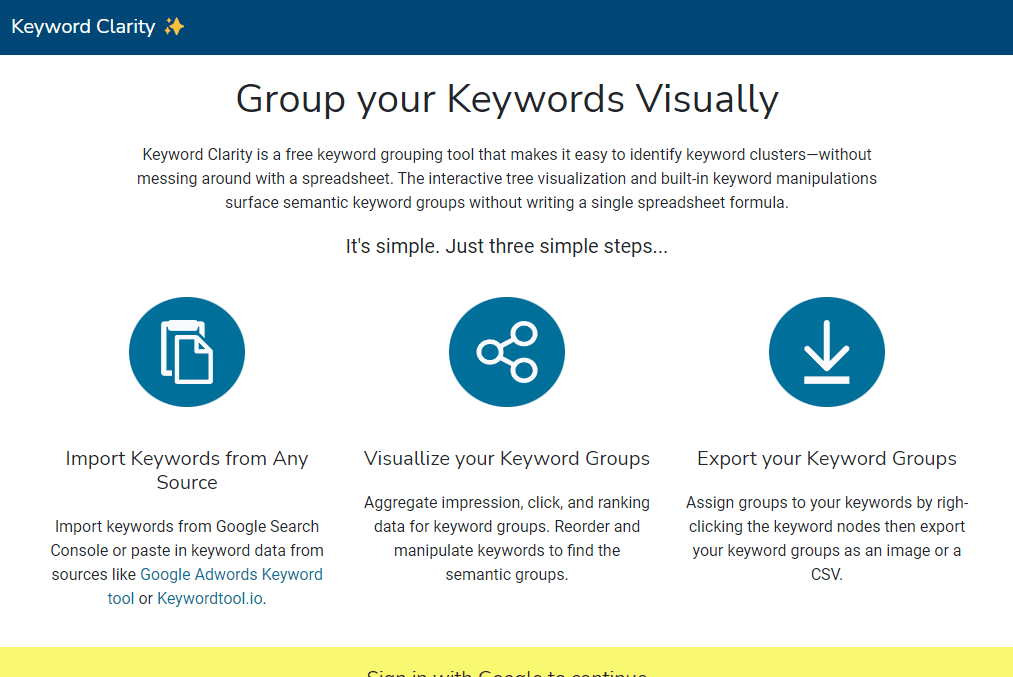
It likely uses lemmatisation (grouping based on word stems) rather than more advanced NLP or costly SERP data analysis. This method is less accurate at determining true search intent.
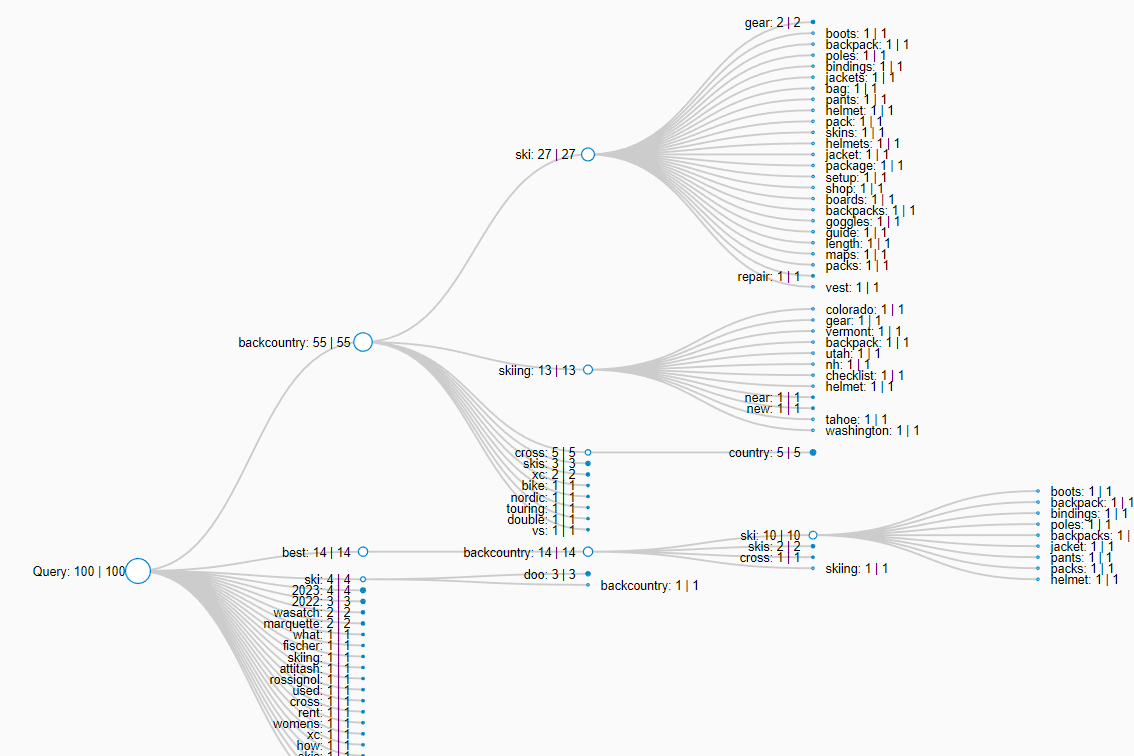
The visual outputs (treemaps, sunburst charts) are interesting for exploring broad topic relationships and identifying sub-niches. However, the groupings aren't precise enough to reliably inform which keywords should be targeted by a single article, unlike SERP-based tools. It's more of an exploratory tool than a strategic content planning tool.
Keyword Grouping (or Clustering) is an SEO process where you group semantically-related keywords based on shared search intent, typically identified by analyzing overlapping search results (SERPs). This helps organize content, build topical authority, understand user intent, and target multiple keywords with a single piece of content efficiently.
Tools use different methods:
Each accurately defined keyword group represents a topic that can likely be covered by a single, comprehensive piece of content. Prioritize creating content for groups containing high-volume, low-difficulty keywords relevant to your goals. Use the groups to structure your site (content silos/clusters) and plan internal linking to build topical authority.
For the best balance of accuracy, usability, and value, the Optiwing keyword grouping tool is highly recommended. It leverages accurate real-time SERP data, handles large keyword sets, offers a simple user experience, and features a flexible, cost-effective pay-as-you-go pricing model with no subscriptions. While powerful suites like Ahrefs and SEMrush offer integrated clustering, their high monthly costs make them less ideal for users focused primarily on grouping. Optiwing, built by an SEO practitioner to solve real-world frustrations, focuses on delivering essential features effectively and affordably.